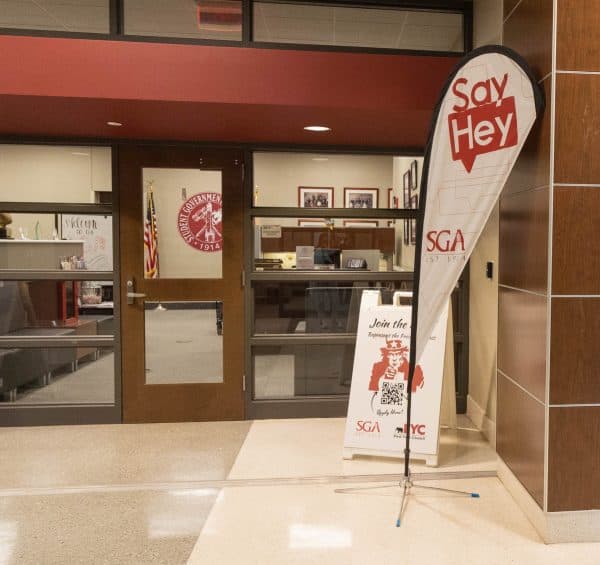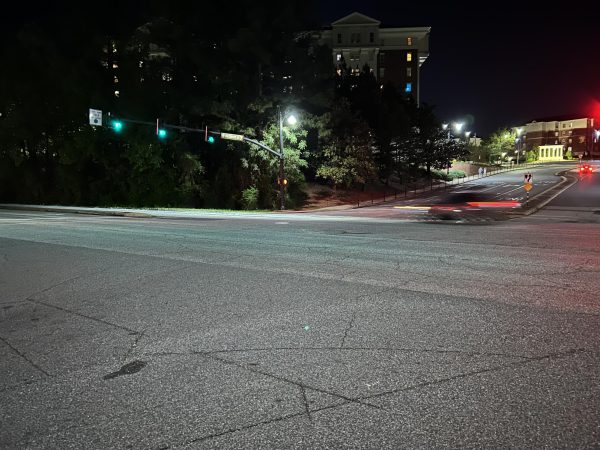Hundreds gather to protest climate change
September 23, 2019
On Friday morning, a group of nearly 250 activists comprised of students, faculty and Tuscaloosa residents gathered at Denny Chimes as part of a worldwide protest against world leaders’ apathy toward climate change.
“In solidarity with the University, we are trying to raise awareness about climate change and show not only our campus, but also the state, that these environmental issues are things that people care about, and we are not going to let them skate by anymore and not do anything about them,” said Julia Alaimo, a junior majoring in environmental engineering and the president of the University of Alabama’s Environmental Council. “We need change, and we need it now. We are not going to put up with this lack of concern for these issues any longer.”
Alaimo, who has been a part of the Environmental Council since her freshman year, said that student interest in environmental issues has been rapidly developing in recent years. Attendance at the council’s meetings has grown from around five people to around 50 people per meeting in the last year and a half alone, Alaimo said.
Big turnout today at the #UAclimatestrike at Denny Chimes, lasting until 2:00. All over the world people are walking out of school, work, and homes to protest climate change @TheCrimsonWhite pic.twitter.com/9qs0l7vBbI
— Alex Jones (@AlexJon65827558) September 20, 2019
“The fate of our human existence is truly in question,” Alaimo said. “Some people say that we have 11 years, some say that we have around 15 months now to change the direction of where we are going as far as our fossil fuel usage and our greenhouse gas emissions. We don’t have enough time to consider if we need to make change. We have to make change. This is something everyone has to care about, not just a few select people, because this isn’t a partisan issue. This is something that affects everyone.”
“In solidarity with the University, we are trying to raise awareness about climate change and show not only our campus, but also the state, that these environmental issues are things that people care about, and we are not going to let them skate by anymore and not do anything about them,” said Julia Alaimo, a junior majoring in environmental engineering and the president of the University of Alabama’s Environmental Council. “We need change, and we need it now. We are not going to put up with this lack of concern for these issues any longer.”
There are numerous steps that the Environmental Council would like to see the University take to combat climate change and to be more environmentally friendly, Alaimo said.
These include:
- Banning Styrofoam on campus
- Investing in solar panels
- Encouraging alternative transportation to cut down on the number of cars on campus
- Cutting ties with companies who deny or dispute climate change
- Forcing food vendors to eliminate single-use plastics in order to remain on campus.
There are also measures they would like to see the city of Tuscaloosa take, such as getting recycling pickup for all of Tuscaloosa.
There were also other climate activists present, including Ann Hewitt, the chairperson of Tuscaloosa’s chapter of the Sierra Club.
“Our goal in the Sierra Club is to enjoy, explore and protect the Earth,” Hewitt said. “What we had when we were younger is now gone, and we need to protect what’s left.”
Hewitt was not only referring to the changing state of the environment, but also the laws that protect it.
“The acts which were passed when we were young are being repealed, and this is a major problem,” Hewitt said.
According to Ruth Collier, a local climate activist, the issue is that the government values money over the environment.
“It’s always what makes the most money, regardless of whether it destroys the environment,” Collier said. “We need to get our priorities straight. Without clean air and water, what good is money?”
Unclean water is a major issue in Alabama, Hewitt said.
“Our environment is crumbling,” she said. “Our water is polluted. Our fish are toxic in certain areas of Alabama. Two-thirds of our waterways are unsafe. When you have children and babies and pregnant mothers eating fish out of these rivers that they think are safe, and they get sick, it’s time to do something.”
According to Ida Gleaton, another local activist, the answer to these issues lies with young people.
“We need the young people to get out and vote,” she said. “Too many of them do not vote, and if they don’t stand up for their rights, then nothing’s going to change.”
Beth Motherwell, an activist holding a poster reading “Respect ur mother” over a picture of the Earth, agreed with this assertion.
“When we were in college, we did a Vietnam War sit-in,” she said. “All we did was sit down and cross our legs, and it made a difference.”
And that’s exactly why Motherwell, along with Gleaton, Collier, Hewitt, Alaimo and hundreds of others in Tuscaloosa joined the global movement on Friday: They know the power of the people, they have seen it used before, and they are willing to use it to force a response to climate change.










